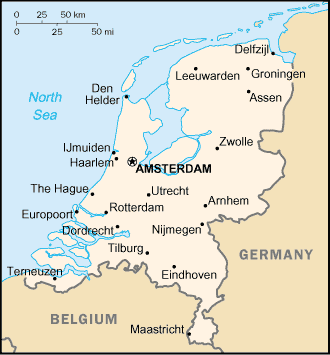The Netherlands
The Netherlands is the European part of the Kingdom of the Netherlands. The Netherlands is a parliamentary democracy under a constitutional monarch, located in northwestern Europe. It borders the North Sea to the north and west, Belgium to the south, and Germany to the east. In many countries, the Netherlands is often referred to by the name Holland, although this usage is incorrect. Holland was the economic powerhouse during the time of the United Provinces (1581–1795). After the Napoleonic era, Holland became a mere province of the Kingdom and was split into North and South Holland in 1840. There are 10 more provinces in the Netherlands. The English adjective and noun for "of or relating to the Netherlands" is "Dutch," which is also the name of the Dutch language. Under Charles V, Holy Roman Emperor and king of Spain, the region was part of the Seventeen Provinces of the Netherlands, which also includes most of present-day Belgium. In 1568 the Eighty Years' War started and in 1579, the northern half of the Seventeen Provinces declared itself independent and formed the Union of Utrecht, which is seen as the foundation of the modern Netherlands. Philip II, the son of Charles V, was not prepared to let them go that easily. It would not be until 1648 before Spain would recognize Dutch independence. After gaining formal independence from the Spanish Empire under King Philip IV, the Dutch grew to become one of the major seafaring and economic powers of the 17th century during the period of the Republic of the Seven United Netherlands. In the era, referred to as the Dutch Golden Age, colonies and trading posts were established all over the globe. Many economic historians regard the Netherlands as the first thoroughly capitalist country in the world. In early modern Europe it featured the most wealthy trading city (Amsterdam) and the first full-time stock exchange, whose inventiveness led to insurance and retirement funds as well as such less benign phenomena as the boom-bust cycle, the world's first asset-inflation bubble, the tulipomania of 1636-1637, and, according to Murray Sayle, the world's first bear raider -- Isaac le Maire, who forced prices down by dumping stock and then bought it back at a discount. After briefly being incorporated in the First French Empire under Napoleon, the Kingdom of the Netherlands was formed in 1815, consisting of the Netherlands, Belgium and Luxembourg. Belgium rebelled and gained independence in 1830; Luxembourg fell under the Dutch monarchy as well but had different rules of ascendancy. When King William III was succeeded by his daughter Queen Wilhelmina in 1890, Luxembourg seceded because its laws prevented women from becoming Head of State. Luxembourg turned to the German branch of the Nassau family, which are still the ruling family in Luxembourg today. The Netherlands possessed several colonies, most notably the Dutch East Indies (now Indonesia) and Suriname (the latter was traded with the British for New Amsterdam, now known as New York). The colonies were first administrated by the Dutch East India Company and the Dutch West India Company, and in the 19th century was directly administrated by the Dutch government. Only then did they become official colonies. During the 19th century, The Netherlands was slow to industrialize compared to neighboring countries, mainly due to its unique infrastructure of waterways and reliance on windpower. After remaining neutral in World War I, the country was occupied by Nazi Germany in May 1940, to be fully liberated only on May 5th,1945. From 1941 until 1945, Germans and their accomplicies systematically murdered over 100,000 Dutch Jews in the Holocaust, and significant numbers of Dutch Roma (gypsies), gay and lesbian individuals, and people with mental retardation and other disabilites. After the war, the Dutch economy prospered again, being a member of the Benelux (Belgium, the Netherlands and Luxembourg) and European Economic Community unions. The Netherlands also became a member of NATO. The Netherlands was among the six founding members of the European Coal and Steel Community, which would later evolve into the European Union.
This article is licensed under the GNU Free Documentation License. It uses material from the Wikipedia article "The Netherlands". |
||||||||||

